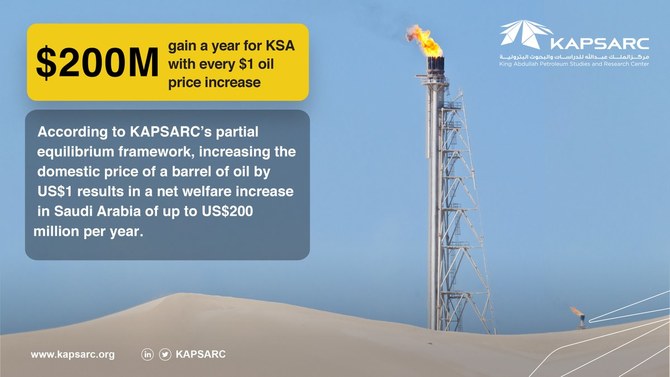A KAPSARC study has revealed that the drop in oil prices after 2012 did not create any structural break in either the long- or short-run relationship of the non-oil GDP with the government’s current and capital expenditure.
The KAPSARC paper found that the Saudi fiscal initiatives play a vital role in keeping the non-oil sector at the heart of the country’s economic development.
The study showed that a 1 percent increase in the current and capital expenditure can lead to 0.3 percent and 0.02 percent increases, respectively, in non-oil sector, which can also be added-value in the long term, while the rise of 1 percent in the contemporaneous growth rates of the current and capital expenditure is associated with 0.13 percent and 0.01 percent increases, respectively, in the non-oil GDP growth in the short run.
The study presented positive effects of labor and capital on the non-oil GDP, showing that a 1 percent rise in both labor and capital each increase the non-oil GDP by an average of 0.51 percent and 0.26 percent, respectively, in the long term.
According to “The Impact of Fiscal Policy on Non-Oil GDP in Saudi Arabia,” the Kingdom implemented a bunch of initiatives, and took adequate measures to raise its capability in reshaping its development plan outside the oil sector.
These initiatives include energy allowances and other subsidies, private sector development plans, including soft loans to boost economic growth, the implementation of giga projects and the Saudi Vision 2030 realization programs.
Researchers from KAPSARC recommended five policies that would help to achieve Vision 2030 objectives. These are: Focusing on developing human capital by investing in education and vocational training; involving private sector in capital projects; applying more governance reforms to boost productivity; using the fiscal space to support the development of Saudi Arabia’s non-oil economy in the short and long run; and improving the Kingdom’s business environment for domestic and foreign investments.
KAPSARC is a non-profit global institution dedicated to independent research into energy economics, policy, technology, and the environment across all types of energy. The center is focused on finding solutions for the most effective and productive use of energy to enable economic and social progress nationally, regionally, and globally.




















